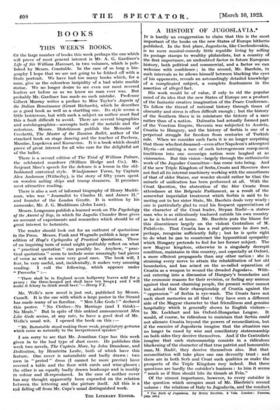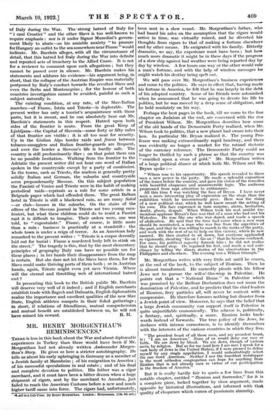A HISTORY OF JUGOSLAVIA.*
IT is hardly an exaggeration to claim that this is the most important of the books on the new States of Europe hitherto
published. In the first place, Jugoslavia, like Czechoslovakia, is no mere musical-comedy little republic living by selling its postage stamps to wealthy philatelists, but a country of the first importance, an undoubted factor in future European history, both political and commercial, and a factor we can welcome with confidence ; in the second, Mr. Baerlein, in such intervals as he allows himself between blacking the eyes of his opponents, reveals an astoundingly detailed knowledge of a complicated subject, a complete fearlessness in the assertion of alleged fact.
His work would be of value, if only to rid the popular mind of its idea that the new States of Europe are a product of the fantastic creative imagination of the Peace Conference.
To follow the thread of national history through times of obscurity and stress is often difficult enough ; but the history of the Southern Slays is in miniature the history of a race rather than of a nation. Dalmatia had actually formed part of the Venetian Empire, Slovenia was subjected to Austria, Croatia to Hungary, and the history of Serbia is one of a perpetual struggle for freedom from centuries of Turkish rule. When we consider such facts it is no longer surprising that those who first dreamed—even after Napoleon's attempted Illyria—at uniting a race of such heterogeneous compment traditions into one sovereign nation were laughed at as visionaries. But this vision—largely through the enthusiastic work of the Jugoslav Committee—has come into being. And if the new Triple Kingdom of Serbs, Croats and Slovenes does not find all its internal machinery working with the smoothness of that of older States, our wonder should rather be that the miracle of unification has been performed at all. With the Croat Question, the abstention of • the bloc Croate from attendance at the Belgrade Parliament, as a result of the somewhat imperialist treatment which Serbia is said to be meting out to her sister State, Mr. Baerlein deals very wisely : one is particularly glad to read his frequent appreciations of the character of the Croat leader, Stepan Radi6—a states- man who is as ridiculously traduced outside his own country as he is beloved at home. Mr. Baerlein puts the blame for this dissentience largely on the violent Centralism of M.
Pribieevie. That Croatia has a real grievance he does not, perhaps, recognize sufficiently fully ; but he is quite right to do what he an to counteract the hypocritical sympathy which Hungary pretends to feel for her former subject. The new Magyar kingdom, otherwise in a singularly decrepit condition, maintains in this country, and especially at Oxford, a more efficient propaganda than any other nation : she is straining every nerve to attain the rehabilitation of her old boundaries, and has seized on the so-called separatism of Croatia as a weapon to wound the dreaded Jugoslays. With- out entering into a discussion of Hungary's boundaries and the economic reasons for their revision, or feeling any animus against that most charming people, the present writer cannot but admit that their championship of Croatia against the " oppression " of Serbia is eye-wash. The Croats have not such short memories as all that : they have seen a different side of the Magyar character to that friendliness and genuine hospitality which is generally shown to English visitors— to Mr. Lockhart and his Oxford-Hungarian League. It would, of course, be ridiculous to maintain that Serbia could not alienate Croatia beyond the powers of reconciliation, but if the enemies of Jugoslavia imagine that the situation can no longer be eased by wise and conciliatory statesmanship on both sides they deceive themselves. And if the Centralists imagine that such statesmanship consists in a ridiculous blackening of the character of that true patriot and honourable man, M. Radie, they deceive themselves also. But that reconciliation will take place one can devoutly trust : and there are in both Serb and Croat such qualities as make the prospects of the Triple Kingdom rosy indeed. But these questions are hardly the outsider's business : to him it seems "much as if Sinn should bite its thumb at Fein."
Of the utmost importance, however, to every outsider is the question which occupies most of Mr. Blerlein's second volume : the relations of Italy to Jugoslavia, and the conduct
• The Birth of Jundatio. By Henry Baerlein. SI Vol.. London : Parsons, Ms. set.)
tif Italy during the War. The' strong hatred of Italy for " i cani Croatici " and the other Slays is too well-known to require emphasis : nor is it under Signor Mussolini's govern- ment likely to abate—as his amiable anxiety "to procure for Hungary an outlet to the sea somewhere near Fiume "would Indicate. Mr. Baerlein alleges, with all the circumstance of detail, that this hatred led Italy during the War into definite and repeated acts of treachery to the Allied Cause. It is not for a reviewer to comment upon such allegations ; but they cannot be passed over in silence. Mr. Baerlein makes his statements and adduces his evidence—his argument being, in short, that the collapse of the Austrian Empire was materially postponed by Italy's conduct towards the revolted Slays and even the Serbs and Montenegrins ; for the honour of both countries investigation cannot be avoided, painful as such a subject naturally is.
The existing condition, at any rate, of the Slav-Italian marches—of Fiume, Istria and Trieste—is deplorable. The present writer has only a tourist's acquaintance with those parts, but it is recent, and he can absolutely bear out Mr. Baerlein's statements in this respect. Hatred upon both sides of the frontier is acute. From the great Keep of Ljubljana—the Capital of Slovenia—some forty or fifty miles of that frontier are visible : it is all too near for security. Up in the Giulian Alps border raids and fracas between tobacco-smugglers and Italian frontier-guards are frequent, and over the border a Slovene's life is hardly safe. The country is still predominantly Slav ; on that point there can be no possible hesitation. Walking from the frontier to the Adriatic the present writer did not hear one word of Italian spoken in the countryside except by a party of carabinieri. In the towns, such as Trieste, the nucleus is generally pretty solidly Italian and German, the suburbs and countryside seem preponderantly Slovene. On this subject population the Fascisti of Venice and Trieste were in the habit of making periodical raids—reprisals as a rule for some article in a Belgrade paper which had offended them. The great Balkan hotel in Trieste is still a blackened ruin, as are many Sokol —or club—houses in the suburbs. On the stairs of the offices of the Slovene journal in Trieste sat two young cora- binieri, but what these children could do to resist a Fascist raid it is difficult to imagine. Their orders were, one was told, to "expostulate." Fiume, of course, is little more than a ruin : business is practically at a standstill : the whole town is under a reign of terror. As an American lady remarked to the present writer : "Trieste is a corpse decently laid out for burial : Fiume a murdered body left to stink on the street." The tragedy is this, that by the most elementary principles of geography Italy can have no possible use for these places ; in her hands their disappearance from the map is certain. But she dare not let the Slays have them, for the Slays could make thriving ports of them both ; or in Austrian hands, again, Trieste might even yet save Vienna. Where will the eternal and throttling web of international hatred end ?
In presenting this book to the British public Mr. Baerlein will deserve very well of it indeed ; and if English merchants establish trade with Zagreb and Dalmatia, English diplomatists realize the importance and excellent qualities of the new Slav State, English athletes compete in their Sokol gatherings ; in short, if relations of friendliness, mutual comprehension and mutual benefit are established between us, he will not











































 Previous page
Previous page